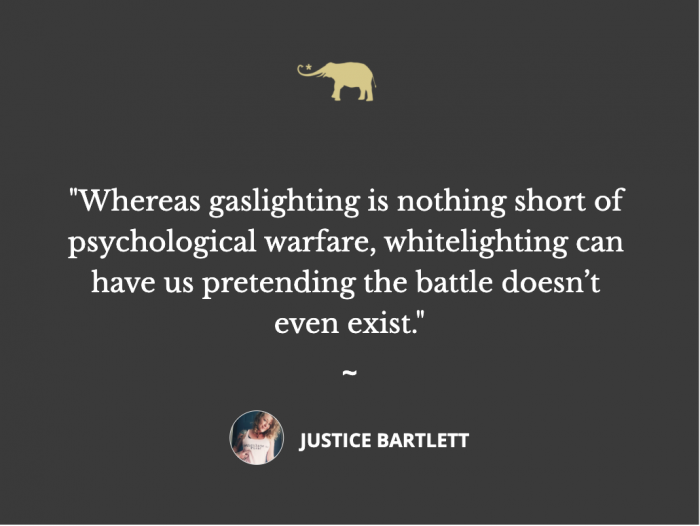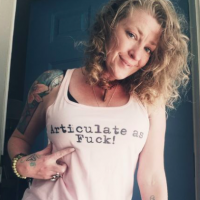There is a form of positivity painting that I have named: whitelighting.
Whitelighting is when a person with whom we are communicating (usually about discomfort or pain) attempts to glaze over our experience with a more positive outlook.
Most people mean well when they offer advice.
They don’t mean to devalue or dehumanize our lived reality, but that is exactly what happens when someone takes a positive paintbrush to our feelings and experiences.
Why do we do this to each other?
Most of us are not very skillful at feeling, or witnessing, discomfort.
For example: I tell a friend that I am having a hard week, that I’m at odds with my daughter or behind on my bills and their response acts as a diversion. “It’s really not that bad. You know there is so much to be grateful for.” This type of response is not an outright denial of what is being felt, experienced, remembered, or shared. Nonetheless, it is subtly dehumanizing, disconnecting, and most certainly fits in the category of a positivity bypass.
Positivity bypassing is where we disappear, or perhaps, paint over stories, information, memories, and feelings that make us uncomfortable. The nature of whitelighting is twofold in that we either heighten or disappear information in order to maintain our reality bias.
We are conditioned, socially, that being uncomfortable should be avoided at all costs. Buy something, watch something, go somewhere, eat something, drink something, change yourself. This is typical of the programming that we receive through the media and advertising industry.
Discomfort means something is wrong, that we’re not trying hard enough—that we need to be fixed. In order to fill that void, there are all kinds of modifications that can be made to our personhood or reality.
Whether it be the pressure to buy a new car, give ourselves a makeover or purchase some coaching program that promises to make us six-figures in the next year, we are constantly being sold bigger and better versions of ourselves and our lives.
Is it any wonder that when we display signs, big or small, of distress or dissatisfaction that the very people who we are closest to will also upsell our hurt and pain?
Whitelighting can be an interpersonal agreement, a process that develops within ourselves, or it can be a transpersonal, or even group agreement to only look at circumstances or events through a certain perceptual lens. Maintain the status quo. Don’t rock the boat.
I recently had one such encounter with a man who I was hoping to develop a professional partnership with. We were getting to know each other as colleagues and friends. There were little warning signs, what I took to be jokes as to what he was, and was not, willing to be to me. These were actually indicators to his deeper personality. Rather quickly, he revealed himself as being possessive and demanding.
In the past, I may have swept these indicators under the rug but in the last few years—as I have worked day and night to repair my own instincts and repair my trust in myself—the indicators set off warning bells through my body. I was physically repelled by this person.
This is how our instincts are meant to function. We are biologically designed to know when something, or someone, is good or bad for us. They feel wrong, taste wrong, smell wrong. That man smelled wrong to me.
The idea of what he could give to me, what we could do together, what we could potentially share, was not glamour enough to turn me from my body’s wisdom. The proposed fantasy was not enough for me to whitelight myself out of my instincts and only focus on the positives. But we do this all the time and gawd knows, I have done it before.
Many new age philosophies prize our ability to shift our perceptions as the ultimate tool to levy reality.
Where there is, undeniably, benefit to be found, at times, in cultivating our attitude in an intentional way, we can also wind up whitelighting and gaslighting ourselves, and others, out of our lived experiences. This does not actually help us to cope more effectively with reality, quite the opposite. It disconnects us from our feelings, instincts, bodies, and each other.
Although not intentionally as nefarious as gaslighting, whitelighting is as equally damaging to our emotional, psychological, and relational health. Whereas gaslighting is nothing short of psychological warfare, whitelighting can have us pretending the battle doesn’t even exist.
Gaslighting is a form of psychological abuse where a person or group makes someone question their sanity, perception of reality, or memories. People experiencing gaslighting often feel confused, anxious, and unable to trust themselves.
Who hasn’t, at some point, felt that way?
Gaslighting has become synonymous with narcissistic abuse. However, a person need not be a narcissist in order to apply this tactic. In fact, we do it to ourselves all the time.
We convince ourselves that we do not feel what we feel, that we do not know what we know. There are many reasons that we do this. We may do this to stay in a situation that we know is not good for us, disappearing or burying signals that are red flags that, if acknowledged, would send us scurrying in another direction.
Whitelighting at first seems less damaging. It’s not abuse. It’s just giving things a more shiny, more pleasing packaging. Only, it’s not the truth. It’s a lie we tell ourselves for comfort and others do it to us, too. As I said, these are not necessarily toxic people; they are often our families and friends. Sometimes they simply do not want to see us hurting. Our hurt may remind them of their own hurt, or, in some cases, they may be the ones who have hurt us and are not willing, or able, to take accountability for their actions.
Accountability is a skillset, and one that is not prized in our comfort-seeking society. It means owning our misdeeds as well as our heroic ones. And well, let’s be honest, in this world, regrettably, reputations are often prized above integrity.
Neither gaslighting nor whitelighting is always a nefarious mind game played by narcissists. It is a psychological strategy that we, and others, apply to distort reality and create a state of denial around a feeling or an experience.
If we want to truly touch our humanness we need to learn to be with the hard, holy, and the humorous without painting the pain away.
How do we do this?
We pause, breathe, feel, and listen. We agree to be here in reality, in our bodies. We do our damn best to validate the full spectrum of feelings—in ourselves and each other.
~










Read 33 comments and reply